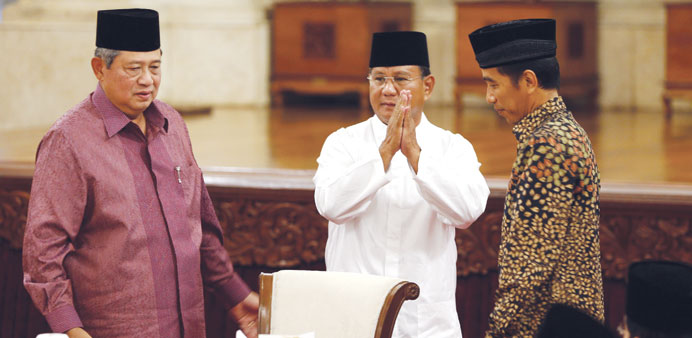Reuters/Jakarta
The Indonesian ex-general widely thought to have narrowly lost this month’s bitterly contested presidential election will not accept the official result until allegations of cheating are investigated, one of his top aides said yesterday.
The rejection is certain to raise concerns of a protracted wrangle that could undermine confidence in Southeast Asia’s biggest economy, or even trigger violence that has so far been almost entirely absent from this election.
By law, the Elections Commission (KPU) must announce the result by July 22. One commissioner told Reuters there was no need to delay the result announcement.
After the Prabowo Subianto camp previously insisted that it would abide by the KPU’s official result of the July 9 election, it suddenly accused it of failing to properly investigate alleged cheating at the polls.
“If they don’t, then that is a crime. This very much calls into question the legitimacy of the whole process,” the former special forces commander told a hastily called news conference in a Jakarta hotel after meeting his key coalition partners.
Vice secretary general of Prabowo’s Gerindra party, Fadli Zon, said there was evidence of many instances of cheating.
“We ask the election committee to solve this problem with recounting,” Zon said. “We will not accept (the result),” he said, demanding the announcement be delayed until the problem was resolved.
Asked if he was challenging the credibility of the Elections Commission, Zon said: “Yes, of course.”
The Prabowo camp has sounded an increasingly shrill note in the wake of the election, accusing his opponent, Jakarta governor Joko “Jokowi” Widodo, of jumping the gun by claiming victory shortly after the polls closed.
Both camps have suggested the other was cheating.
However, independent election watchers have praised the Elections Commission for its handling of polling and the transparency during the nearly two-week counting process.
“So it’s just too much, it’s excessive to say that the KPU is not credible. In fact we have built our credibility with transparency,” KPU commissioner Sigit Pamungkas told Reuters.
“So far the counting process is going according to schedule. We have not thought about postponing or making a new rule that alters our schedule.”
Jokowi’s claim of victory was based on quick counts of a sampling of the about 130mn votes by private pollsters and which have been accurate in the past. Several polls showed Jokowi had won by about five percentage points. Prabowo has countered that other quick counts show he won. However, two of those pollsters have refused to allow their counts to be audited.
Once the Elections Commission does announce the result, the candidates can challenge it in the Constitutional Court which would likely mean weeks of further delays in formally announcing a new president who would take over in October.
Signalling his concern, outgoing President Susilo Bambang Yudhoyono, before a dinner at the presidential palace tonight to which he invited both candidates, called for a peaceful end to the election of the next leader of the world’s third largest democracy.
“I urge all the people of Indonesia to safeguard the final chapter of the election process,” said Yudhoyono who is coming to the end of his second five-year term. Indonesia, a member of the G-20 group of nations, was swept by bloodshed in which hundreds of people were killed when strongman ruler Suharto was forced to step down in 1998 after more than three decades in power.
It has since made a slow transition to full democracy, with this only its third direct presidential election.
Analysts said Prabowo would find it difficult to provide the necessary evidence to justify delaying the election results.
Suspected problems at polling stations appear to have been relatively small. Some analysts calculate it would need a change in up to 7mn votes to hand Prabowo victory.
“Prabowo’s team would need to have some idea of how the irregularities added up to justify asking the (Elections Commission) not to release the election result,” said Paul Rowland, a Jakarta-based political analyst.
“The problems with the counting process and even intimidation or violence on election day have been relatively insignificant,” he said.

(From left) Indonesia President Susilo Bambang Yudhoyono stands beside presidential candidates Prabowo Subianto and Joko u201cJokowiu201d Widodo during a meet
